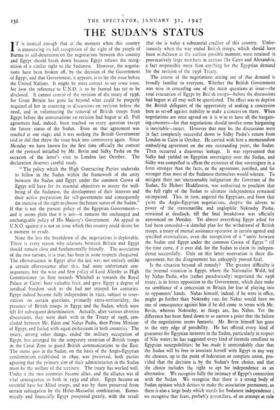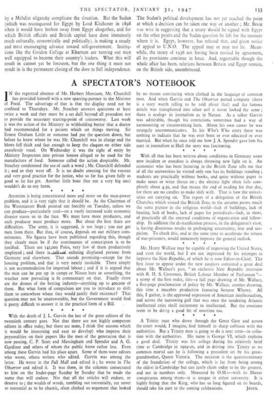THE SUDAN'S STATUS T is ironical enough that at the
moment when this country 1 is announcing its full recognition of the right of the people of Burma to self-determination the negotiations between this country and Egypt should break down because Egypt refuses the recog- nition of a similar right to the Sudanese. However, the negotia- tions have been broken off, by the decision of the Government of Egypt, and that Government, it appears, is to lay the issue before the United Nations. It might be more correct to say some issue, for how the reference to U.N.O. is to be framed has yet to be disclosed. It cannot consist of the revision of the treaty of 1936, for Great Britain has gone far beyond what could be properly required of her in assenting to discussions on revision before she need, and in volunteering the removal of British troops from Egypt before the conversations on revision had begun at all. Full agreement had, indeed, been reached on every question except the future status of the Sudan. Even on that agreement was reached at one stage, and it was nothing the British Government said or did that threw the issue back into controversy again. Since Monday we have known for the first time officially the content of the protocol initialled by Mr. Bevin and Sidky Pasha on the occasion of the latter's visit to London last October. The declaration deserves careful study.
" The policy which the High Contracting Parties undertake to follow in the Sudan within the framework of the unity between the Sudan and Egypt under the common Crown of Egypt will have for its essential objectives to assure the well- being of the Sudanese, the development of their interests and their active preparation for self-government and consequently the exercise of the right to choose the future status of the Sudan."
If that is not the present policy of the Egyptian Government— and it seems plain that it is not—it remains the unchanged and unchangeable policy of His Majesty's Government. An appeal to U.N.O. against it is not an issue which this country could desire for a moment to evade.
None the less the breakdown of the negotiations is deplorable. There is every reason why relations between Britain and Egypt should remain close and fundamentallly friendly. The association of the two nations, it is true, has been in some respects chequered. The efferverscence in Egypt after the last war, not entirely unlike la certain effervescence after this, had some unfortunate con- sequences, but the wise and firm policy of Lord Allenby as High Commissioner (as firm towards Whitehall as towards the Royal Palace at Cairo) bore valuable fruit, and gave Egypt a degree of juridical freedom such as she had not enjoyed for centuries. Egypt indeed became fully independent in 1922, subject to reser- vations on certain questions, primarily extra-territoriality, the presence of British troops in Egypt and the Sudan, which were left for subsequent determination. Actually, after various abortive discussions, they were dealt with in the Treaty of 1936, con- cluded between Mr. Eden and Nahas Pasha, then Prime Minister of Egypt, and hailed with equal enthusiasm in both countries. The treaty, among other things, ended the military occupation of Egypt, but arranged for the temporary retention of British troops in the Canal Zone to guard British communications to the East. The status quo in the Sudan, on the basis of the Anglo-Egyptian condominium established in 1899, was preserved, both parties agreeing that the primary aim of their administration in the Sudan must be the welfare of the territory. The treaty has worked well. Under it the two countries became allies, and the alliance was of vital consequence to both in 1939 and after. Egypt became an essential base for Allied troops, and was by them preserved from certain subjugation by the Hitler-Mussolini combination. Econo- mically and financially Egypt prospered greatly, with the result that she is today a substantial creditor of this country. Unfor- tunately when the war ended British troops, which should have been withdrawn at the earliest possible moment, were retained in provocatively large numbers in centres like Cairo and Alexandria, a fact responsible more than anything for the Egyptian demand for the revision of the 1936 Treaty.
The course of the negotiations arising out of that demand is broadly familiar to everyone. Whether the British Government was wise in conceding one of the main questions at issue—the total evacuation of Egypt by British troops—before the discussions had begun at all may well be questioned. The effect was to deprive the British delegates of the opportunity of making a concession here as set-off against inability to make a concession there. When negotiations are once agreed on it is wise to have all the bargain- ing-counters—for that negotiations should involve some bargaining is inevitable—intact. However that may be, the discussions were in fact completely successful down to Sidky Pasha's return from London to Cairo in October. He carried with him a memorandum embodying agreement on the one outstanding point, the Sudan. Then occurred a disastrous leakage. It was represented that Sidky had yielded on Egyptian sovereignty over the Sudan, and Sidky was compelled to affirm the existence of that sovereignty in a form stronger than the facts, or the agreement, justified, and far stronger than most of the Sudanese themselves would tolerate. To mitigate their not unreasonable indignation the Governor of the Sudan, Sir Hubert Huddleston, was authorised to proclaim that the full right of the Sudan to ultimate independence remained unimpaired. This, in turn, angered the Egyptians, and from that point the Anglo-Egyptian negotiations, despite the advent to power of the statesmanlike and anglophile Nokrashy Pasha, remained at deadlock, till the final breakdown was officially announced on Monday. Yet almost everything Egypt asked for had been conceded—a detailed plan for the withdrawal of British troops, a treaty of mutual assistance operative in certain agreed and specified eventualities, even the recognition of a " unity between the Sudan and Egypt under the common Crown of Egypt " till the time came, if it ever did, for the Sudan to claim its indepen- dence successfully. Only on this latter -reservation is there dis- agreement, but the disagreement has unhappily proved fatal.
Is the situation beyond all remedy? The greatest difficulty is the internal situation in Egypt, where the Nationalist Wafd, led by Nahas Pasha, who (rather paradoxically) negotiated the 1936 treaty, is in bitter opposition to the Government, which dare make no semblance of a concession to Britain for fear of playing into its opponents' hands. Nahas himself, indeed, if he were in office, might go further than Nokrashy can, for Nahas would have no one of consequence against him if he did come to terms with Mr. Bevin,- whereas Nokrashy, as things are, has Nahas. Yet the difference has been fined down to so narrow a point that the failure of the negotiations seems fantastic. Mr. Bevin himself has gone to the very edge of possibility. He has offered every kind of guarantee for Egyptian interests in the Sudan, particularly in respect of Nile water; he has suggested every kind of formula emollient to Egyptian susceptibilities; he has made it unmistakably clear that the Sudan will be free to associate herself with Egypt in any way she chooses, up to the point of federation or complete union, pro- vided that the decision is by the Sudan's free choice, and that the choice includes the right to opt for independence as an alternative. We recognise fully the intimacy of Egypt's connection with the Sudan. We recognise that there is a strong body of Sudan opinion which desires to make the association permanent, as there is also a large body which stands for Sudanese independence ; we recognise that fears, probably grouniless, of an attempt at rule by a Mandist oligarchy complicate the situation. But the Sudan (which was reconquered for Egypt by Lord Kitchener in 1898 when it would have broken away from Egypt altogether, and for which British officials and British capital have done immensely much culturally, economically and politically), is making a steady and most encouraging advance toward self-government. Institu- tions like the Gordon College at Khartum are turning out men well equipped to become their country's leaders. What this will result in cannot yet be foreseen, but the one thing it must not result in is the permanent closing of the door to' full independence. The Sudan's political development has not yet reached the point at which a decision can be taken one way or another ; Mr, Bevio was wise in suggesting that a treaty should be signed with Egypt on the other points and the Sudan question be left for the moment where it is. Egypt, however, has refused that, and given notice of appeal to U.N.O. The appeal may or may not lie. Mean- while, the treaty of 1936 not having been revised by agreement, all its provisions continue in force. And, regrettable though the whole affair has been, relations between Britain and Egypt remain, on the British side, unembittered.



































 Previous page
Previous page